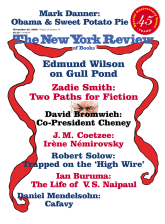In response to:
Brilliant, Beautiful & Byzantine from the September 25, 2008 issue
To the Editors:
I was delighted to read Glen Bowersock’s kind, learned, and fascinating response to my book Byzantium: The Surprising Life of a Medieval Empire [NYR, September 25], and happy to warm myself in its glow. However, a query suggests that I ought to clarify his interpretation of one part of my history.
I state that “without Byzantium Europe as we know it is inconceivable.” Professor Bowersock generously describes this as “bold and provocative.” But he goes on to assume that I am projecting forward the analysis of Constantinople as a bulwark against Arab advances and attacks through the centuries.
My “thesis” is more focused. Had the Arabs succeeded in capturing the Byzantine capital when they besieged it between AD 674 and 718, then they would undoubtedly have been victorious “throughout the Balkans, into Italy and the West…at a time when political fragmentation reduced the possibility of organized defense.” In the following centuries, I agree, Western European strength and the shift of Arab operations to Baghdad altered the balance of forces into the far more permanent, tripartite division of the Mediterranean world.
But the Arabs’ initial ambition was to make themselves the rulers of Constantinople and thereafter of all Rome, just as their religious claim famously inscribed in the Dome of the Rock in 692 was that the revelation to their Prophet made them the superior successors to both Judaism and Christianity. This needs clear and unequivocal emphasis in my view—hence my “bold” claim. Had the Arabs extended their sweeping advance to incorporate New Rome on the Bosphoros, as they expected, it would have created a hypercharged Islam, hugely strengthened by the great city’s boat-building and trading capacities, its sheer wealth and expertise, its taxing powers at the pinch point where Europe meets Asia, together with all the prestige of being the rulers of the Queen City. At the time, nothing would then have stopped their expansion into the West, making them direct rulers of the Mediterranean world.
The Arabs knew what the Roman Empire was. They claimed to be the true inheritors of the Christian revelation. Constantinople was not the end point of their campaign. By preventing their original ambition, the Byzantines “made Europe possible…allowing small units time to develop their own strengths.”
Judith Herrin
King’s College London
This Issue
November 20, 2008
The Co-President at Work
At Gull Pond
Two Paths for the Novel



